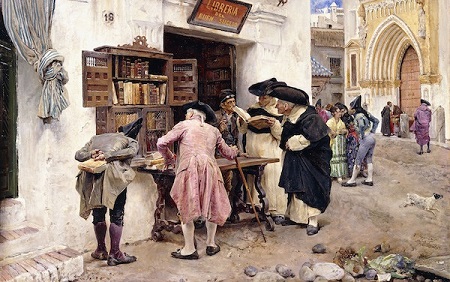
“Adam and Eve"
Roger François (1928 – ) Roger Francois was born in Petite Riviere, on the Artibonite plain of central Haiti. He began as a wood sculptor and still carves occasionally. He has been painting as well since the early sixties. He loves to paint and sculpt Haitian women, both nudes and market women with baskets and braids. Besides women, M. Francois paints animals: cats, dogs, horses and owls, and in the early 1990’s, began painting sun and moon heads on human bodies. He also does an occasional surreal voodoo painting. His style is robust, bold and always fresh and new. A painting of his hangs in the National Museum, Brussells, Belgium and another was exhibited in the show of Geoffrey Holder’s collection, “Spirits” at the Katonah Museum of Art, (NY) in May 1991. His work has appeared in books and museum shows internationally.
|
Editor's Page Moral Socialism 
The name of Socialism has become a
dirty word. The fault lies with its extreme incarnation, Communism,
as practiced by the Soviet Union, China, Cuba and several wannabes in
Africa and Latin America. Here we will attempt to reconstruct
socialism either in its original meaning or by giving it a new
meaning: It refers to
a system of social organization in which private property and the
distribution of income are subject to social control, but the
conception of that control has varied, and the term has been
interpreted in widely diverging ways, ranging from statist to
libertarian, from Marxist to liberal. In the modern era, “pure”
socialism has been seen only rarely and usually briefly in a few
Communist regimes. Far more common are systems of social
democracy, now often referred to as “democratic socialism"...
Continue reading Book Review Valis by Philip K. Dick 
VALIS (acronym of
Vast Active Living Intelligence System) A
perturbation in the reality field in which a spontaneous
self-monitoring negentropic vortex is formed, tending progressively
to subsume and incorporate its environment into arrangements of
information. Characterized by by quasi-consciousness, purpose,
intelligence, growth and an armillary coherence. Current Events
Why American Leaders Persist in Waging Losing Wars 
As America enters the 18th year of its war in Afghanistan and its 16th in Iraq, the war on terror continues in Yemen, Syria, and parts of Africa, including Libya, Niger, and Somalia. Meanwhile, the Trump administration threatens yet more war, this time with Iran. (And given these last years, just how do you imagine that’s likely to turn out?) Honestly, isn’t it time Americans gave a little more thought to why their leaders persist in waging losing wars across significant parts of the planet? So consider the rest of this piece my attempt to do just that. Let’s face it: profits and power should be classified as perennial reasons why U.S. leaders persist in waging such conflicts. War may be a racket, as General Smedley Butler claimed long ago, but who cares these days since business is booming? And let’s add to such profits a few other all-American motivations. Start with the fact that, in some curious sense, war is in the American bloodstream... Continue reading Features James Lovelock - Earth's Holy Fool by Michael Ruse 
The inventor James Lovelock was born in England in 1919. Early during the Second World War, armed with a degree in chemistry, he went to work for the British government on a variety of projects on the borderline between the physical and the biological sciences. He had an incredible ability to make gadgets from piles of old junk, often surplus to the military effort, and this continued after the war. His greatest triumph was to invent the electron capture detector, an instrument so accurate that if one spilt a solvent on a rag in Japan, one could detect it in Britain a week later. Naturally, a man with such talents attracted attention. Lovelock went freelance and in the early 1960s he was often in California aiding one of his clients, the American space agency NASA, which was just then trying to detect if there was life on Mars. Continue reading The Say of the Land - Is language produced by the mind? Romantic theory has it otherwise: words emerge from the cosmos, expressing its soul 
In conversation at the Hay Festival in Wales this May, the English poet Simon Armitage made an arresting observation. Discussing the nature of language and why it is so good at capturing the experience of being alive, he said: ‘My feeling is that a lot of the language that we use, and the best language for poetry, comes directly out of the land.’ Armitage was placing himself within the Romantic tradition’s understanding of the origins of language, which argues that words and grammar are not the arbitrary inventions of human brains and minds, but are rather suggested to human beings by nature and the cosmos itself. Language is an excellent way to understand the Universe, because language springs from the things it describes.
The English philosopher Owen Barfield, a member of the Oxford Inklings in the 1930s and ’40s, whose work as a philologist convinced him that the Romantic tradition was broadly right, put it succinctly. Words have soul, he said. They possess a vitality that mirrors the inner life of the world, and this connection is the source of their power. All forms of language implicitly deploy it. Poets are arguably more alert to it because they consciously seek it out...
Continue Learning a Foreign Language Should be Obligatory in Every School 
In the 1960s, in our public schools in California along the border with Mexico, Spanish language-learning was a requirement, beginning in sixth grade. I couldn’t wait to get to sixth grade to start learning Spanish. Our school was more than 50 per cent Mexican-Americans, and I was keen to understand them as they switched back and forth from fluent English to fluent Spanish (or, as they called it, ‘Mexican’). As I began to learn it, my friends asked if I spoke Spanish at home. No, just in school. I was invited to join a Mexican rock ’n’ roll band based in Tijuana, and we performed at Mexican dances and on Mexican television, where I sang lead on ‘La Bamba’ and other songs. My aunt used to say I looked like a bastard brother among the other members of the group. I loved it. I had two identities, Dan the American and Daniel the Chicano (or so my friends would tell me – ‘You’re an honorary Mexican, cabrón!’) Learning Spanish changed my life...
Continue reading
Fiction Mañana Maria by PJ Miller 
I’m sitting—no, reclining—in an
oversized hospital chair at Ft. Kessler, Biloxi, Mississippi and
dangling my legs over the thing, trying to get the energy to attempt
to walk again. My right leg doesn’t want to work. It doesn’t
help that I have various tubes in my arms. If I get up to attempt a
walk down the hall I have to drag along a veritable life support
system. The doctors tell me it will take time. That’s what they
tell everyone here. The clear plastic tubes are restrictive and bow outward
like thin strands of spider webs leading to bags of clear fluids. The
clear, plastic bags remind me of a pet store with a goldfish captured
and tied off into an invisible plastic prison. I doubt half of the
goldfish survive a week. And, here I am over six months in this
plastic bag, and tied off. How long will I survive in this plastic
bubble?
Contune reading Downsized (bilingual) by Frank Thomas Smith 
The fact that “everything happens at once” is a cliché doesn’t make it less true. Shortly after I lost my job my wife left me. Both the wife and the job were good ones, and the loss in both cases was due to downsizing – if you know what I mean – so I was pretty devastated. At least the company gave me a Golden Handshake, whereas the wife took the house, the car and the kids. Downsized (Recortado)
Que “las cosas pasan todas al mismo tiempo” es un cliché, pero no por eso deja de ser verdad. Al poco tiempo de quedarme sin trabajo, me dejó mi mujer. Tanto el trabajo como mi mujer eran buenos, y en ambos casos la pérdida fue a causa de un “downsizing”, un recorte de personal (usted me entiende), por lo que quedé bastante desolado. La empresa al menos me dio una indemnización, mi mujer, en cambio, se quedó con la casa, el auto y los niños. Love in the Life of Spies (Chapter 8) by Frank Thomas Smith 
“Are you comfortable in your quarters, Frau Cornelius?” Lt. Jacks asked the attractive young lady seated across from him in Bavarian-American accented German. It was his first interrogation on his own, but he had been advised that it was routine, she was merely a defector’s wife. The room was small but tastefully decorated and they sat in padded chairs. During the war the Germans had used it for the good-cop part of interrogation. If the P.O.W.s, American and British flyers, were not cooperative they went next to the dungeon below for a few days for softening up, no torture, just isolation, were then brought back up for more officer and gentleman treatment. Most stuck to the name, rank and serial number bit, but some were willing to discuss personal things like wives, children, home towns, with their interrogators, and this inevitably led to elements of military information. Either way, they all wound up in P.O.W. camps...
Miryam - Part Eleven by Luise Rinser 
It was almost evening. The ram-horns were already being blown. Announcements that the feast was about to begin. I could hear the death cries of the slaughtered animals from the temple mount, the city already smelled of fresh blood which flowed from the altar down through the gutters to Kidron and the stink of the entrails which had been burnt on the altar lay repulsively in the alleys. The first celebrant passed by holding his lamb in his arms, disemboweled, bled to death. That vile temple slaughtering. Thousands of lambs died that day. Death, everywhere blood and death. How could I eat a lamb that evening? How could I ever again eat the flesh of killed animals? Each animal’s death cry is his, all the blood is his. But then how should I go to the Seder feast without eating lamb? It was the law: the lamb must be eaten, eaten up till the last morsel. In remembrance of that last meal, which our forefathers ate before the removal from Egypt, standing, ready for travel, hurried. And nothing of the meal may be left over. Since then it has been duty, commandment, strict law: every Yisraelite must participate in the Seder feast and must eat of everything on the table. Also the lamb, the usual food. I cannot. But one must. It is a sin not to eat the Seder meal. Continue reading HeyZeus - A Second Coming in Brooklyn - A Mystery Play in Seven Scenes by Frank Thomas Smith 
A young man -
Thomas - meets an African-American couple walking on the lake
in Brooklyn's Prospect Park. He suspects that the man - HeyZeus - is
Jesus, but has almost insurmountable difficulty convincing anyone
else - until Alma appears, a young woman who believes him, but may
have another agenda. Thomas first meets unbelief in his friends, his
colleagues, his fiance, a psychiatrist, a bishop and, finally,
himself. Anthroposophy The Fifth Gospel - Lecture 4 of 7 lectures by Rudolf Steiner 
Our considerations will begin with the so-called Pentecost event. In the first lecture I indicated that our investigation can at least begin with this event. For this event presents itself to clairvoyance as a kind of awakening which the personalities on a certain day, Pentecost, experienced - the personalities normally called the apostles or disciples of the Christ Jesus. It is not easy to evoke an exact perception of all those extraordinary events, and we will have to recall – from the depths of our souls, so to speak – much of what we have already gained from our anthroposophical considerations if we want to combine exact perceptions with all which our lecture cycle has to say about this subject... Continue reading Poetry Parting by Frank Thomas Smith 
A
window flew open clattering wood, Trees by Joyce Kilmer 
I
think that I shall never see Stopping By Woods on a Snowy Evening Evening by Robert Frost 
Whose
woods these are I think I know. Words and Music It Was a Very Good Year by Ervin Drake - Sung by Frank Sinatra 
When I was seventeen  Letters to the Editor 
Browse in the SCR E-book Library
You can find us under the Southern Cross in the Traslasierra Valley, Province of Córdoba, Argentina. Visitors always welcome. Just follow the sign that reads: La Cruz del Sur.
sso we can advise you when the next issue is ready. |